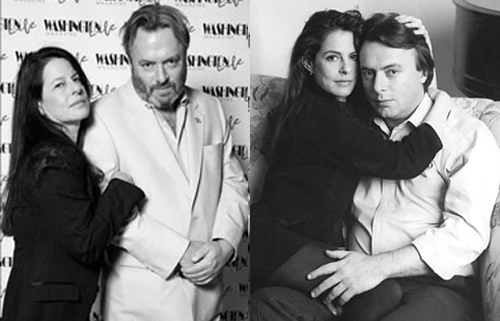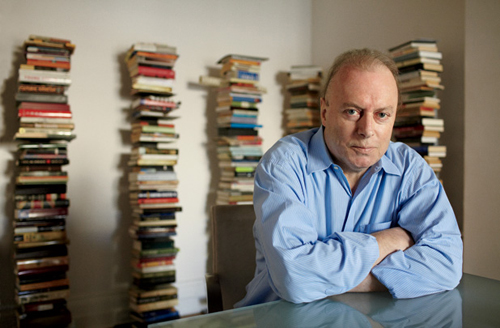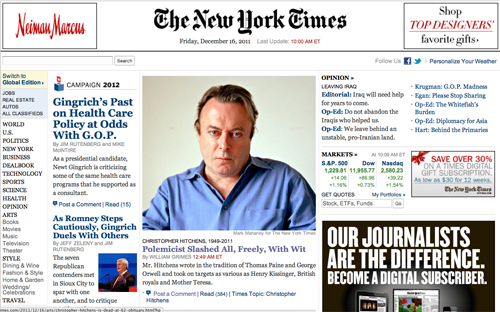“My chief consolation in this year of living dyingly has been the presence of friends” wrote Hitchens last June and I am heartbroken to know he passed away yesterday…
I didn’t agree with everything he said (but who would? who could?) yet I learned a lot of very interesting things from him especially his relentless atheism that provoked the wrath of the faithful!
He sold his soul to the devil of alcohol and booze who helped him write but killed him prematurely. Keeping his great wit until the end he said: “In whatever kind of a ‘race’ life may be, I have very abruptly become a finalist”.
Here are some quotes from him that I like:
“There are all kinds of stupid people that annoy me but what annoys me most is a lazy argument.”
“People are being too easily pleased. I’m amazed they settle for so little.”
“A gentleman is someone who is never rude by accident.”
“A lot of friendships absolutely depend upon a sort of shared language.”
“I hate stupidity, especially in its nastiest forms of racism and superstition.”
His friend Richard Dawkins said: “I think he was one of the greatest orators of all time. He was a polymath, a wit, immensely knowledgeable, and a valiant fighter against all tyrants including imaginary supernatural ones.”
I got to know his work via his excellent articles and book reviews and then I read his great book, “God is not great, how religion poisons everything”. I laughed all the way through the book! I liked his succinct biography of Thomas Jefferson and his latest book, Arguably, is patiently waiting in my Kindle.
Graydon Carter says: “There will never be another like Christopher. A man of ferocious intellect, who was as vibrant on the page as he was at the bar.”
I read in Time that When Hitchens was diagnosed with esophageal cancer, believers of all faiths prayed for his health — and his salvation. The staunch atheist responded that he was grateful for the good wishes and hoped that praying for him made the faithful feel better. “Hitchens was never far below boiling point. He was an evangelical secularist, an atheist warlord.”
His friend, the novelist Ian McEwan, once said of Hitchens: “It all seems instantly neurologically available: everything he’s ever read, everyone he’s ever met, every story he’s ever heard. I’ve seldom met anyone who speaks in such fluid, elegant, nuanced sentences, dizzying in their breadth of reference.”
I loved the fact that he didn’t like Kissinger, Lady Diana, Jerry Falwell or Jacqueline Kennedy (he called her widow of opportunity!)
I strongly disagreed with him on his stand on the Iraq war or his view on abortion but he bought me back when I read what he had said of George Bush, when he was governor of Texas: ‘He is unusually incurious, abnormally unintelligent, amazingly inarticulate, fantastically uncultured, extraordinarily uneducated, and apparently quite proud of all these things’.
Another quote: “Marx says criticism of religion is the beginning of all criticism. Philosophy starts where religion ends, just as chemistry starts where alchemy breaks off or astronomy starts where astrology runs out. It is the necessary argument. Not believing in the supernatural is the critical thing.”
These past few months, It was heart wrenching to read his articles about the cancer killing him but he never lost his grace. His memoir, Hitch-22, was a good (if not great) read because I was curious about what made this man who he is. I would like to see his friends, Salman Rushdie and Martin Amis, write about his death, his life…
Read about his last days here.
Read Hitchens’ article about his own imminent death here.
A good article about him is on today’s NYTimes here.









A beautiful tribute, thank you Michele.
A very heartfelt tribute, Michele. As a believer, the best thing I can think of to say is that I don’t believe in the God he didn’t believe in, either.
Hi is one of my favorite authors too. Thanks for your message.
I set the poem up and read it, and when I reached that celebrated end, “A sense of falling, like an arrow-shower/Sent out of sight, somewhere becoming rain,” Christopher murmured from his bed, “That’s so dark, so horribly dark.”
http://www.nytimes.com/2011/12/18/opinion/christopher-hitchens-consummate-writer-brilliant-friend.html?_r=1&hp
Certainly, a great loss. We need contrarians now more than ever.
With the passing of Christopher Hitchens, we lost a prolific force for rationalism. It’s too bad, however, that Hitchins’s definition of intelligence was limited to his words and not actions. His pithy prose and evidence based arguments devastated his intellectual opponents and revealed much of their unscrupulous thinking and unscientific thought processes. At the very end, however, his own premature demise due to smoking and alcohol exemplified a quintessential human trait: our uncanny ability to live in cognitive dissonance. For a man of reason, he did not follow the scientific evidence when it came to his own health. The number one cause of esophageal cancer is indeed smoking and alcohol. The scientific evidence for these ills is as irrefutable as that of evolutionary science. At the end, Mr. Hitchins died prematurely for not acting or accepting on the parallel scientific evidence that he blamed many a religious leaders for ignoring when it came to their faith.
Life is a bitter irony. Had he been as rational about his health as he charged his opponents for not being about their faith, he would have likely been with us longer. Of course, even in his demise, he proves that scientific evidence is paramount and stands above and beyond the ego and is our closest approximation of the truth. It is blind to man, woman, child, followers or not, even if the subject is as intelligent as Christofer Hitchens.
We will miss you Mr. Hitchens.
A great voice silenced… Gone way too early as he said it! He will be missed a great deal. Thank you Michele for such a heartfelt tribute.
How can you praise a guy like him? He is the one that coined the word
Islamofascist. He supported invasion of Iraq. He supported the imperialist
war of Falkland Island that Britain imposed on Argentina in 1982. He
demonized Muslims all the time. He was a leftist turncoat that showed his
true colours after 9/11.
You really seem to be living in a vacuum of information. The only thing
that matters to you is sounding like an intellectual, without any
substance. I am sorry to be so blunt, but some of the things that you say
are totally shocking.
I agree with you Doctor Sahimi on his sheer stupidity and stubbornness when he sided with rumsfeld, bush and wolfowitz (I never forgave him for not taking back his support for this war) but you have to agree that the guy was a brilliant literary reviewer, he was courageous in taking an unpopular stand (against the frivolity of Diana or the war criminal kissinger). I liked his view on religion and his grace confronting his cancer and death.
To me the world cannot be that clear cut, black and white, good and evil all the time; there is an ocean of grayness in between and this dude was floating on the light gray side…
Yes, Michele, you are correct about that.
His was a brilliant mind and, no matter how much one disagrees with him, CH’s intelligence must be acknowledged. All of his positions were extremely well supported by his arguments and dismissing any of them as being wrong does not make them so. Only defeating him in a rational discussion would suffice, but i personally haven’t heard of anyone, let alone Muhammad Sahimi, ever succeeding in that beyond any reasonable doubt. Alas, the time for arguing with CH is over now, because unfortunately he cannot answer anymore.
An earlier comment by Ali above here does not make much sense to me, because it assumes that every person’s supreme goal should be to live as long as possible. Why? What is so “rational” about that? Maybe CH saw it differently? Maybe he wanted to be himself at all times and to live his life as fully as he possibly could? Wouldn’t that then explain his “behavior”? If he felt fully alive only when smoking and drinking, then there was nothing irrational or inconsistent with his way of life.
I also agree with Dr. Sahimi on this point. I never liked him as a person, nor did I like his style of argumentation (forceful and arrogant); but I liked his audacity to make cogent scientific arguments against the norm. His view on Iraq obviously came back to bite him (BTW, did he ever say he was wrong about that?) And I don’t know if he was a turncoat politically or if he never fit the standard mold. But I viewed his hatred of religion egalitarian. His views were emboldened after 911 because the whole experience consolidated his theories about religion as a whole and its propensity to give birth to fringe fanatics. His stereotyping was based on his problem with all people of religious backgrounds, not just one.
I guess MarK could be right here. It is possible that Mr. Hitchins had a secret death wish. Although I seriously doubt he was interested in becoming a martyr in the path of smoking and drinking. Was he so interested in having a short life he would have foregone chemotherapy to beat the cancer and embraced his earlier decision to end his life prematurely by smoking and drinking heavily. I don’t think so! He wanted to live like most other rational people would, especially if they’re an atheist!
Rationally speaking, engaging in behavior that shorten’s one’s life is no different than having suicidal tendencies. I say this fully cognizant that most people in the world have shortcomings and we all have our own vices. I also say this knowing that most people in this world have an innate tendency for living. What seems to feed and maintain this inevitable dissonance in our thinking is hope. We hope that the evidence won’t apply to us or that we tend to burry or ignore irrefutable facts about things we know like smoking kills! We pick examples of cases where it didn’t and we appease anxiety about our bad behavior. Really, no different than religious people’s view about the science of evolution!
My point was that even men of rational thought are at times irrational. The problem is when those rational people are often too self righteous and don’t extend the same benefit of the doubt to others across the isle. Mr. Hitchins had a family, a great carrier, and he was an atheist. There’s no evidence that he was depressed nor did he have a death wish. He also tried to extent his life by using chemotherapy and radiation. This proves that he did want to live.
To find a fringe excuse without evidance to legitimize his irrational behavior is irrational itself. MarK can easily argue that no one is perfect, and even intelligent, rational people make irrational decisions at times. That we often fall short of our own aspirations, which is basically the point I was trying to make. What I’m now adding to clarify is that he criticized others for being irrational in whatever aspect of their lives he was criticizing them for, yet his own irrationality using the same mechanisms of wishful thinking escaped his notice. I hope this clarifies my point.
Great discussion. Thanks to all of you. No one of us gets it completely right. Together, we come closer.
Actually, Ali, this latest attempt to explain your point confuses it even more. You are again arguing that his behavior was irrational, but you are basing this conclusion on your own perception of how people want to live their lives. Your understanding of this issue may be correct in many instances – maybe even in most of them – but it does not mean that it is correct in CH’s case. As far as i can tell, he never had a “death wish” and he certainly wanted to use whatever medicine was capable of to stay alive, but it does not mean that he always wanted to prolong his life AT ANY PRICE. And it is clear to me that smoking and drinking were such integral parts of who he was and of his preferred way of life, that quitting either or both was simply too steep a price to pay for him. There is nothing irrational about it, if one accepts the fact that people do not all have the same values when it comes to the way they want to live their own lives.
One does not need to confront Hitchen’s “rationale” and “well-documented” reasons for his despicable acts. The fallacy of his “arguments” regarding invasion of Iraq is too glaring; just look at the facts on the ground. The stupidity of his arguments in support of the Falkland Islands war of 1982 is too obvious: an old bankrupt imperial power like Britain claiming ownership of Islands half way around the world, close to the shores of Argentina? Is that the “well-documented argument”?
Hitchen helped begin what I called an “industry called Muslim demonizing” in this nation,
http://www.huffingtonpost.com/muhammad-sahimi/call-to-burn-the-quranan_b_708566.html
which has filled the pockets of a few, but has brought hatred for millions. If Hitchens needed an incident in which some people were killed by religious zealots as an affirmation of his disbelief in religion and God, he certainly did not need 9/11. He could have looked at the slaughter of hundreds of thousands of indigeneous Latin Americans and Africans by Christian missionaries, or at what is being done to Palestinians by Israelis, or what was done to Muslims by the Serbian fascists. No, he could not “remember” these, because his goal was to demonize Muslims, nothing more, nothing less.
MarK, I’m surprised you maintain the line of argument that some people, possibly Mr. Hitchens prefer to die rather than give up booze and smoking. You say that I’m basing my conclusion on “my own perception of how people want to live their lives.” I grant you that the detail of people’s lives is far too complicated to assume; but I know that the most elemental design of the brain revolves around the survival instinct. It’s the root of behavior. Of course, there is the occasional exception such as a seriously depressed person; but those are the grand exceptions and not the rule. When you say here that “Your understanding of this issue may be correct in many instances – maybe even in most of them – but it does not mean that it is correct in CH’s case” let me tell you this: Mr. Hitchins regreted his behavior the moment his doctor revealed his diagnosis of esophageal cancer to him. Believe me, I’m a healthcare provider and people naively believe that they’re invincible. And they’re often arrogant about it. Until they realize they’re not. Then they face the inevitable humility. People make all sorts of irrational decisions regarding their lives, but our health is the prime example of this. And that’s the cognitive dissonance that’s inherit in most of us. We never know how important our health is until we lose it. Here, Hitchens put himself in a situation where he suspended logic in order to get short term pleasure. So, what’s new? We all do that. But I don’t know why you don’t see the irony of Hitchens’ case. This kind of behavior is akin to what religious people do about their faith. In order to get their own existential pleasure, they suspend their disbelief and refute scientific facts simply because they want to believe in a higher being. Mr. Hitchens may have gotten his existential dose from booze and smoking instead of the Almighty, but he was awfully critical of others while forgiving his own contradictions.
Insofar as the desire to live, the survival instinct is inherent in all of us. It’s that driving force that has safely cradled the very genetic code that is in every cell of your body. This very code has been on a journey from its inception as the first single cell organism billions of years ago all the way into you right now. Every generation has added a small bit to it. And if a fish, a bird, an ape or any human along your ancestral lineage hadn’t possessed this survival instinct you wouldn’t have been here today to contribute to this blog. So, I recommend that you don’t philosophize via moral relativism on this point, nor claim that Mr. Hitchens’ behavior was rational because the premise to his actions were his desire to die. It’s important to realize that Hitchens, like any other rational, non-depressed person also wanted to live at an elemental level, but he was flawed like the rest of us in that he lived with his own contradictions and eventually paid the price for them. In fact, I will go so far to say that all of us who engage in this kind of behavior, where we know our actions will hurt us without any real benefit than pleasure and yet ignore the evidence, are being irrational. But that’s what makes us human because we can rationalize the irrational and even go as far as arguing that we smoke and drink heavily because we want to die. Kierkegaard would have been proud of you MarK! 🙂
To Dr. Sahimi, I don’t know if Mr. Hitchens had an exclusive ax to grind with Muslims or not. My understanding was that he hated all religions and religious people alike. And maybe yes, he was more inclined to hate those whom he knew less about than those he grew up with. I’ll give you that. I generally disagreed with his political views any way. Like Michelle, I was impressed with his boldness when it came to criticizing those pillars of belief the society had taken for granted over the millennia. His argument for the Iraq war was a great mistake that destroyed so many lives here in the US and in Iraq. I wonder if he ever expressed any regret or culpability for beating the drums of war so exhuberantly.
My respect and admiration toward Michele prevent me from saying what i otherwise would about the “comment” above here.
I finally caught up with your posting on Hitchens today and was once again pretty impressed by the way you organized the material and made it easy for me to get to just the right amount at a time. I will explore more links tomorrow and I look forward to reading excerpts of his writing here and there. I do want to buy and read his Hitch 22 to get to know the details of him.
Thank you again for doing the research and bothering to create the wonderful posting on this wonderful fellow.
What an astonishingly brilliant individual he was, indeed.
Thank you for sharing this; and like always, I cannot help not admiring your vast array of knowledge , talent, and intelligence.
May you live long and happy.
Thanks Mark and Ali for the interesting exchange of views!
@Mark I suppose you are referring to Sahimi’s comment, not Ali’s.
I mostly agree with Ali’s arguments; but I don’t believe we should optimize our lives only for longevity. We do risky things every day: drive cars, consume food/beverages that are not good for us in the long run, etc. Did I optimize my longevity by eating those delicious parisian croissants for breakfast this morning, or the foie gras yesterday? Probably not, but some risks are definitely worth taking! So it all boils down cost/benefit analysis. If CH had known with 100% probability that his smoking and drinking would kill him at 62, rather than living another 20 years he might have stopped. But he couldn’t know that for sure; none of us can. Of course smoking is an extreme example, because it is so detrimental to health, but humans are genetically adapted to prefer short term gain/pleasure rather than long term benefits. Our behavior is a manifestation of that.
Yes, Frank, you are absolutely correct – my previous comment was in response NOT to Ali, but to that other person whose comments make it abundantly clear, at least to me, how right Christopher Hitchens really was. As for Ali’s latest variation on the theme of irrational behavior and the irony inherent in it, my response to that one would require a bit more spare time than i have right now.
I agree 100% with Frank about the daily cost benefit analysis that’s a part of being human. But my example was based on Hitchins’ case of being a heavy smoker and drinker and not a normal person having the occasional candy or croissant! The odds of the latter are not proven harmful anywhere near the preponderance of evidence for the former. It’s all about relative risk. The odds of dying from driving a car is minuscule compared to the odds of dying from heavy smoking and drinking. Hitchens must have known these statistics but he ignored them completely as he engaged in wishful thinking. And we all do. Non of us are completely coherent in thought (look at me, I can’t even make my simple point clear to anyone here! LOL!) All I was trying to say, in my own convoluted way, was that his wishful thinking was of the same kind that religious folks engage in. And this was the irony of the whole thing. That he spent a lifetime criticizing others’ wishful thinking and yet, failed to recognize his own. Oh well… I give up..
BTW, enjoy those croissants Frank… reading your post motivated me to pick some up on my way home!!! Oh… this cost/benefit analysis is an easy one to calculate! Ali:0 Croissant:1 🙂
1. Among active and relatively healthy people older than 90 whom i personally know, several of them smoked and drank for most of their lives, while i certainly knew some who lived “cleanly” but died before reaching 50 years of age. All of that means that smoking + drinking does not equal early death, but rather simply increases the chances of it happening.
2. Choosing to indulge is not always necessarily irrational, but may simply be a calculated decision based on estimated risks and rewards.
3. Being religious is a very different issue. From the point of view of atheists, it is a belief in a dogma that is unsupported by scientific facts, while “unhealthy” lifestyle may sometimes be a case of taking a calculated chance.
4. Yes, we all have survival instinct (among others) ingrained in us, but what separates us from most other animals is the fact that our lives are governed not by instincts alone but also by intentional choices we make.
5. So far no one here presented any evidence that Christopher Hitchens always wanted to stay alive as long as possible. It is perfectly conceivable to suspect that his goals in life were quite different, that he wanted to enjoy every moment of his life as intensely as he could and, while knowing full well that he was taking the risk of shortening his lifespan, he believed that assuming such risk was worth it for him.
6. In other words, since neither i nor anyone else was inside his head when he was alive, i certainly cannot prove that his behavior was rational, but conversely i do not see any semblance of proof offered by anyone here that it wasn’t.
7. We may hold a personal opinion that he was “unwise”, but that is not the same as being logically irrational. If he did not believe that living as long as possible was his ultimate goal that must be achieved at any price, then his behavior may not have been irrational at all.
Wow MarK… I should have tried itemizing my arguments like you… it works!!! 🙂 Well, kudos’ Sir. You do have a point. And frankly, my brain has stopped working at this point of the day to even attempt a counter argument. I’d like to blame it on all those croissants I ate yesterday because of Frank! Sorry Frank, but someone has to get blamed here! If not Christ Hitchens then it’s you!!! 😉
Just kidding!
Happy Holidays to all! 🙂
Ali.
My “itemization” was highly arbitrary and not meant to be taken seriously. Meanwhile, Ali may deserve a point or two for “Christ Hitchens” – now that is ironic for sure!
In the latest issue of The Jewish Journal, Rob Eshman recalls how he introduced his teenage son to Hitchens as “a big fan”, to which the latter replied, “Oh, don’t be a fan, be a critic. Be a doubter. Find faults. Argue.”
Very well said.
Have a healthy and peaceful 2012, Michele, and most of your readers as well!
I think the following link definitively settles our discussion concerning Hitchens’ particular case.
“Christopher Hitchens: Despite Cancer, I’d Drink & Smoke Again.”
You can see him replying to the question in a short video. http://www.huffingtonpost.com/2010/08/17/christopher-hitchens-desp_n_685021.html
Concerning humans living their lives rationally, I doubt we could give a general definition of what that would mean…
So lets celebrate the moment by having some croissants and coffee next time you guys come to Paris.
@MarK +1 for catching Ali’s Freudian typo!
Thank you very much, Frank, for finding it.
This interview crashes Ali’s assumption that “Mr. Hitchins regreted his behavior” (misspellings notwithstanding) and comes as close to proving my point as is humanly possible, flatly denying any regrets and practically using the same words as i did when he said that he “was knowingly taking a risk”. As for a general definition of living rationally, i would say that it means making every conscious decision and/or choice in life based fully on nothing but the person’s factual knowledge. Not sure i know anyone who would fit that definition 100% (or zero) but some people do manage to come pretty close.
LOL! Yes, I’ve failed third grade spelling several times. The last time, I believe, was a couple of years ago! If it weren’t for autocorrect I wouldn’t be coherent to myself! “Christ Hitchens” remains a Freudian highlight though. But you know, Frank has now totally reopened this can of worms by sharing this Charlie Rose interview. This not only doesn’t settle it for me it blows the case wide open.
I was resigned to give Hitchens the benefit of MarK’s argument, but I’m now astonished at what I heard during his interview. I mean, come on Hitchens! I just lost all respect for you! He replies to Rose’s question of knowing what he knows now, would he still smoke and drink.. and he says yes!
Say what? I mean, him not regretting the Iraq War is more forgivable position than not regretting this one! The final effect of the Iraq war may arguably be unclear, but the results of his unabashed smoking and alcoholism are already in! Hello! I’m sorry but you got esophageal cancer, a cancer that’s caused specifically by the combination of these two behaviors! What’s wrong with you saying you were wrong and given a second chance, you would do it differently in this respect?! Is the ego so large that you can’t confess to any wrong decisions?! What’s this Mitt Romney’s sequel to No Apologies?!
I mean, he starts by making an argument that life is a wager.. ok, I’ll give him that… we all take our chances as we already established in previous comments… we may even bet on scientifically untenable cost/benefit ratios. Yes, we’re all stupid that way too. That’s our prerogative. But then, to come back and say that he would do it again knowing that he lost his life’s wager?!!! Come on MarK! Even a fan of CH like you should object to that line of logic! I mean, I don’t know about Christopher Hitchens, but “Christ Hitchens” would be smart enough to know that if one already knows that he/she is holding a losing ticket, it’s only rational to change the ticket if time travel is offered as an option! It’s not a wager any more! It’s deterministic!!! I mean, hello! you hoped you had super genes. You hoped that your excessive smoking and Boozin’ wouldn’t cause cancer for you. That it was a problem for others, and not you. But this just in. You were wrong! It did cause cancer in your case! Your genes were influenced by those factors and here we are. O’ Captain Hindsight, even with the benefit of this unknowable knowledge you would still do the same? What, you think your genes will literally dodge the carcinogens the next time around? Wasn’t it Einstein who said insanity is doing the same thing over and over and expecting different result?!
I think this latest confession by CH just confirms two possibilities, that he was either nuts when it came to his health (another Steve Jobs Syndrome!) or that his ego didn’t fit inside the Grand Canyon (again, another Steve Jobs Syndrome!) Hey, did I just discover a pattern here? Anyway… It’s a fact that one does not “need” to drink and smoke himself to death in order to qualify as a Bohemian, to be a good writer, or to be an intellectual! A more logical (less ego driven) answer to Rose would have been: if I were do things over, I would find healthier substitutes to keep myself creative! After all, greater minds than me have already done so! But no, the ego on this guy is so big that he would never confess on being wrong. In this specific case, not even after the answer is revealed! Hey Mr. Hitchens, the answer sheet on the test you took yesterday is in, the answer to question 1 was A. You chose B. Explain why are you’re still insisting that you would choose B if you took the test again today? Are you just being silly?
This also supports an earlier statement I was making when comparing CH to religious folks. Deep down, some religious people know their narrative may be wrong, but they will stick to the same line! I don’t know, hope, fear, ego, delusion? Whatever.
Come on MarK, I was generous to the guy… I gave him the benefit of the doubt of your argument: that he was wagering… he was hoping he could get away with it. But now that he knows he couldn’t get away with it he still insists! And no, it’s not because he has decided that he loves smoking and drinking more than life. Than it was the only way he could have been creative…. and that it was all worth losing his life over. It’s just that he doesn’t want to say he was wrong. Or maybe he’s not willing to think outside the delusion of a “Bohemian lifestyle” he’s created in his own mind. Maybe it was just a demented way he had observed and picked up from his parents as he explains in the video. Again, the very same mechanism of thinking he charged religious people with! I will not give up on that point!! LOL!
Anyone out there wants to support the late Mr. Hitchin’s on this latest “no regrets” addendum?! Frank?! You reopened this can of worms! LOL!
Ali out! (off to a Christmas party now!) 🙂
People say that what we’re all seeking is a meaning for life. I don’t think that’s what we’re really seeking.
I think what we’re seeking is an experience of being alive, so that our life experiences on the purely physical plane will have resonance within our own innermost being and reality, so that we actually feel the rapture of being alive.
That’s what it’s all finally about.
-Joseph Campbell
All of Ali’s arguments here would make sense only if CH’s ultimate goal throughout his life was to live as long as possible. It is obvious that this was not the case. Some people consider living fully and intensely far more valuable than living healthily. Essentially, for CH that meant a combination of his three passions – writing and speaking polemically, smoking, drinking: eliminate any one of these and life becomes incomplete, eliminate two and life is not worth living; eliminating three would equal death. This is a bit of oversimplification of course but not by much. Passions are not like prescription medications for which brand name products can be substituted by generic ones (and as we all know even those do not always turn out to be adequate replacements). We can’t choose our passions the way we do laundry detergents in a supermarket. No, such passions are a part of a person’s DNA – a part of who we are.
There are several fallacies in Ali’s latest comments and i don’t have enough time and, frankly, interest to analyze every one of them. But most of my objections would come down to two main errors in Ali’s approach: applying one person’s values to another’s life and presuming to know a very intelligent person better than that person knows himself.
Nice quote, Entropy. As for me, i am taking off on vacation away from civilization now – see you next year sometime.